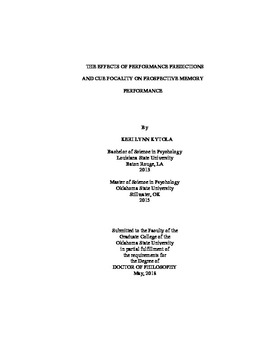| dc.description.abstract | The present study investigated the extent to which memory beliefs (as indexed by performance predictions and postdictions) affected older adults' prospective memory (PM) performance on PM tasks that had different retrieval processing demands. Participants were sequentially assigned to a prediction condition (prediction, no prediction) and a PM condition (focal, nonfocal). During the experiment, participants completed a lexical decision task (LDT) that required making word judgments about letter strings. Participants in the prediction condition then predicted their PM performance. Next, participants completed a distractor task before carrying out the PM task embedded in the LDT. All participants then postdicted their PM performance. PM performance was scored as the proportion correct out of ten opportunities. Given that recent research has suggested that making predictions about one's PM performance may serve as an effective strategy to improve younger adults' PM performance (Kytola & Reese-Melancon, manuscript in preparation; Meier, von Wartburg, Matter, Rothen, & Reber, 2011; Rummel, Kuhlmann, & Touron, 2013), predictions were expected to have a beneficial effect on older adult's PM performance. However, predictions were hypothesized to be more effective for improving participants' PM performance on the PM task with nonfocal cues. Results demonstrated that predictions did not improve participants' PM performance. The addition of the PM task led to ongoing task costs (McDaniel & Einstein, 2007; Smith, 2003), but predictions did not increase participants' monitoring retrieval processes for either PM task.1 Predictions and postdictions accurately reflected participants' actual PM performance on both PM tasks, and their confidence scores were high. Finally, a relationship between perceived task importance and PM performance was found indicating that as PM task importance ratings increased, PM performance also increased. Whereas importance ratings were generally higher for the ongoing task than the PM task, they were equal when participants predicted their PM performance. However, the ratings were higher for the ongoing task than the PM task when participants did not predict their PM performance. These findings suggest that predictions may not be useful to employ as a strategy to improve older adults' PM performance, even on more difficult PM tasks. Implications of these findings are discussed. | |
